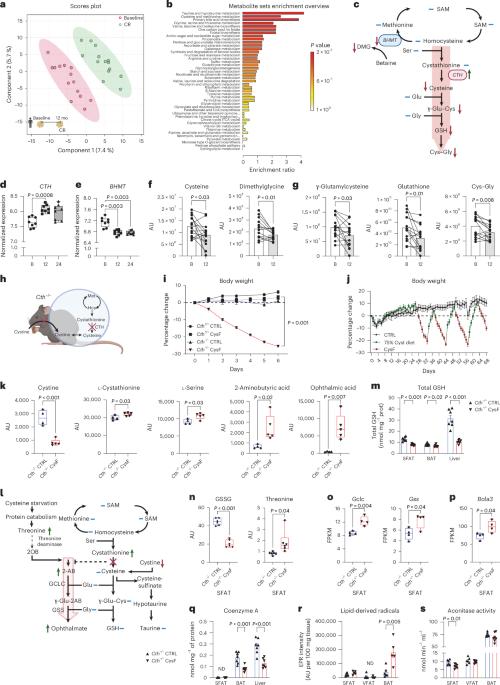Cysteine depletion triggers adipose tissue thermogenesis and weight loss
IF 20.8
1区 医学
Q1 ENDOCRINOLOGY & METABOLISM
引用次数: 0
Abstract
Caloric restriction and methionine restriction-driven enhanced lifespan and healthspan induces ‘browning’ of white adipose tissue, a metabolic response that increases heat production to defend core body temperature. However, how specific dietary amino acids control adipose thermogenesis is unknown. Here, we identified that weight loss induced by caloric restriction in humans reduces thiol-containing sulfur amino acid cysteine in white adipose tissue. Systemic cysteine depletion in mice causes lethal weight loss with increased fat utilization and browning of adipocytes that is rescued upon restoration of cysteine in diet. Mechanistically, cysteine-restriction-induced adipose browning and weight loss requires sympathetic nervous system-derived noradrenaline signalling via β3-adrenergic-receptors that is independent of FGF21 and UCP1. In obese mice, cysteine deprivation induced rapid adipose browning, increased energy expenditure leading to 30% weight loss and reversed metabolic inflammation. These findings establish that cysteine is essential for organismal metabolism as removal of cysteine in the host triggers adipose browning and rapid weight loss. The authors describe how reduced dietary availability and systemic loss of cysteine leads to adipose tissue browning and rapid weight loss in mice and humans.


半胱氨酸消耗触发脂肪组织产热和体重减轻
热量限制和蛋氨酸限制驱动的延长寿命和健康寿命诱导白色脂肪组织“褐变”,这是一种代谢反应,增加热量产生以保护核心体温。然而,特定的膳食氨基酸如何控制脂肪产热尚不清楚。在这里,我们发现热量限制引起的体重减轻减少了白色脂肪组织中含有硫醇的硫氨基酸半胱氨酸。小鼠的全身性半胱氨酸耗竭会导致致命的体重减轻,脂肪利用增加,脂肪细胞褐变,这在饮食中恢复半胱氨酸后得到拯救。从机制上讲,半胱氨酸限制诱导的脂肪褐变和体重减轻需要交感神经系统通过独立于FGF21和UCP1的β3-肾上腺素能受体传递的去甲肾上腺素信号。在肥胖小鼠中,半胱氨酸剥夺导致脂肪快速褐变,能量消耗增加,导致体重减轻30%,并逆转代谢炎症。这些发现表明,半胱氨酸对机体代谢至关重要,因为宿主体内半胱氨酸的去除会引发脂肪褐变和快速体重减轻。
本文章由计算机程序翻译,如有差异,请以英文原文为准。
求助全文
约1分钟内获得全文
求助全文
来源期刊

Nature metabolism
ENDOCRINOLOGY & METABOLISM-
CiteScore
27.50
自引率
2.40%
发文量
170
期刊介绍:
Nature Metabolism is a peer-reviewed scientific journal that covers a broad range of topics in metabolism research. It aims to advance the understanding of metabolic and homeostatic processes at a cellular and physiological level. The journal publishes research from various fields, including fundamental cell biology, basic biomedical and translational research, and integrative physiology. It focuses on how cellular metabolism affects cellular function, the physiology and homeostasis of organs and tissues, and the regulation of organismal energy homeostasis. It also investigates the molecular pathophysiology of metabolic diseases such as diabetes and obesity, as well as their treatment. Nature Metabolism follows the standards of other Nature-branded journals, with a dedicated team of professional editors, rigorous peer-review process, high standards of copy-editing and production, swift publication, and editorial independence. The journal has a high impact factor, has a certain influence in the international area, and is deeply concerned and cited by the majority of scholars.
 求助内容:
求助内容: 应助结果提醒方式:
应助结果提醒方式:


